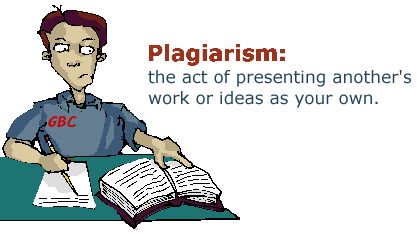 |
Avoiding Plagiarism
|
Students can avoid plagiarism by
maintaining good research habits and paying attention to the basic rules of
writing and documentation.
In general, remember that you must
credit the source whenever you
- use another person's idea, opinion
or theory
- paraphrase the words of another
person (spoken or written)
- quote another person
- use facts, statistics, graphs,
drawing, video, audio or other creative expression
The Research Stage
Plagiarism often begins in the notetaking
stage of the research process. Before you set out to research your subject,
you should have a clear question in mind so that the notes you take will be
relevant. If you are going to a library and can not take the materials home,
you should be especially careful to take down the exact details of the information
and your source. One way to do this is to use one index card for each idea or
quotation you gather.
However you take down the information, you should
- Keep careful and complete information
on your source by accurately noting the author, title, publisher, editor,
date of publication, place of publication, and any additional information
including the page numbers where notes or quotes were taken (www.yahoo.com
doesn't cut it!)
- Keep track and distinguish your
ideas from the ideas of others
- Recognize the distinction between
words that are your own and words that are not your own; carefully note what
is your idea, someone else's idea or someone's direct quote
- Ensure that quoted material is
exactly as in the original source-- be precise
The Writing Stage
Once your research is done, keep
in mind the following points:
- Organize your work in an original
way rather than following the pattern used by one of your sources
- Use your own words and ideas to
frame and control your work
- Support those ideas by either
quoting or paraphrasing the work of your sources
- Give credit for copied, adapted
or paraphrased material using in-text citations and the MLA format
- When paraphrasing, state the idea
in your own words. Don't just make superficial changes to the source.
- Distinguish between what is common
knowledge and what is not common knowledge and needs to be documented (for
example, it is common knowledge that Ottawa is the capital of Canada)
- When in doubt, cite your source
The Editing Stage
- Read your work carefully. Is it
clear what your ideas are and what the ideas of your sources are? Ask yourself
if there is enough of your own work in the project. Do you understand every
concept? Is the vocabulary your own?
Continue on for
more on Avoiding Plagiarism........

